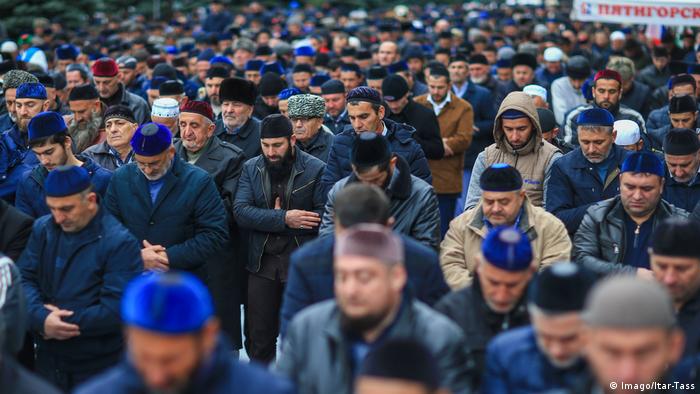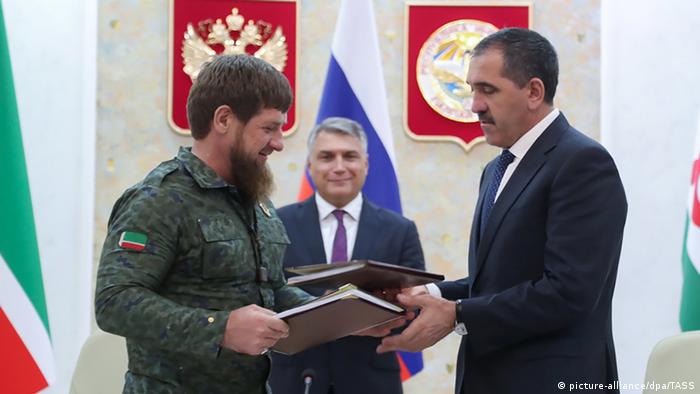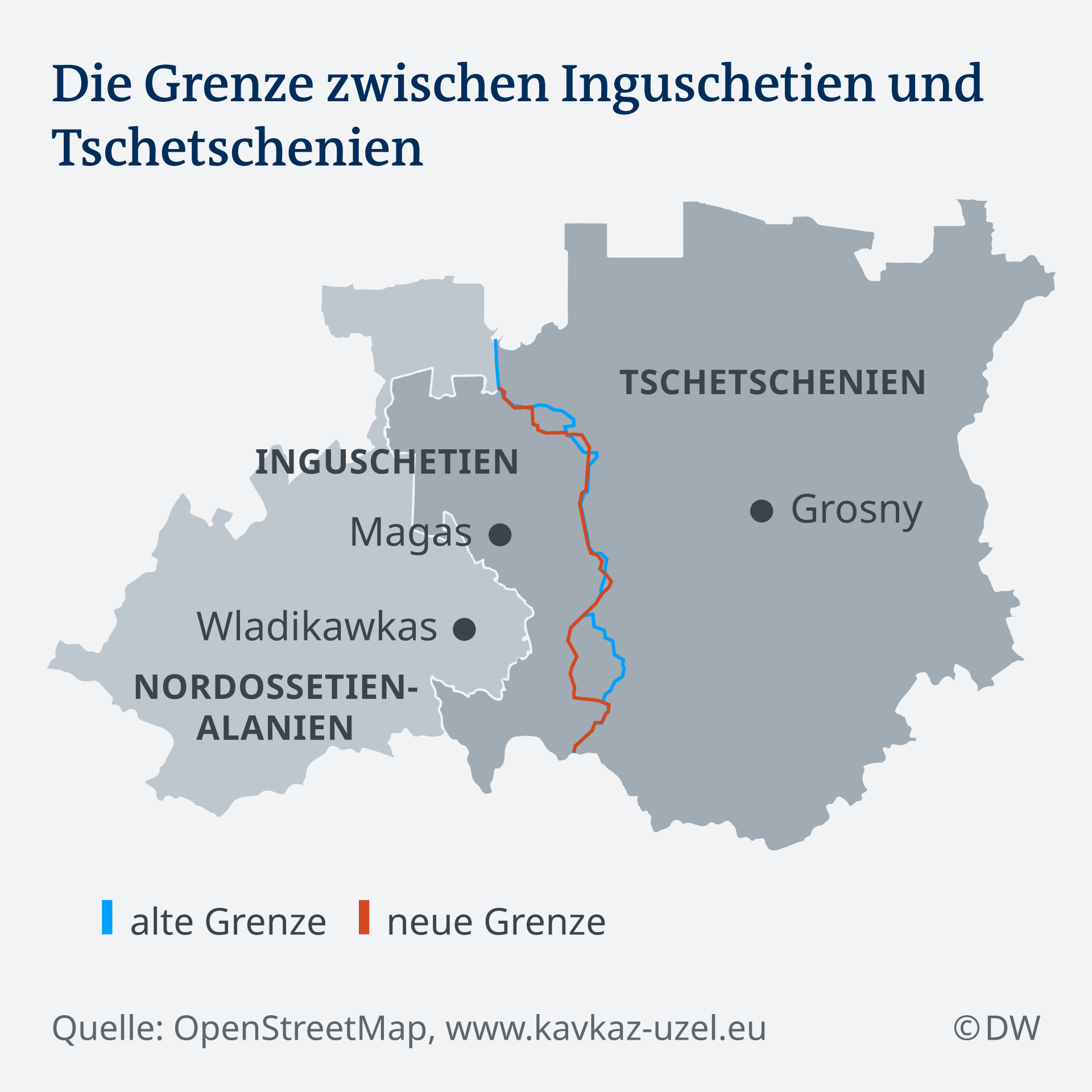In Ingushetia, the people go on the road. However, unlike in the rest of Russia elites and the police show solidarity with them. In the case of the protests of a disputed border. But there’s more to it.

Since the end of September, people in Ingushetia’s capital Magas to protest
Ingushetia is rarely in the news, and if so, then mostly because of their larger neighbor and former sister Republic of Chechnya. So also this time. For over a week, there are street protests in Magas, the capital of the Muslim North Caucasus Republic against a new regional border with Chechnya. Basically, it’s much more than an unexpectedly broad resistance against a disputed administrative act. Some observers feel the final phase of the Soviet Union, recalls, and see the protests as a warning for Moscow.
Opaque Land Exchange
In the Soviet Union of Chechnya and Ingushetia were part of a common Autonomous Republic. After the collapse of the USSR in the early 1990s, Chechnya declared its independence, which later led to a bloody war with the Central government. Ingushetia remained the Moscow faithful. Today, both stand-alone part are republics, the administrative border between them did not exist before. That should change now. The leaders of both republics, the Chechen Republic Ramzan Kadyrov and Ingush Yunus-Bek Yevkurov, have signed up to the end of September an agreement on the new border and made it to their respective parliaments approve. The paper is difficult to understand, and allegedly provides for an equivalent land swap. Some experts doubt, however, and think that Chechnya would be getting much more Land than it emits.

Ramzan Kadyrov and Yunus-Bek Yevkurov after the signing of the controversial border agreement
The population in Ingushetia is also suspicious and afraid of the important parts of your home would be incorporated from Chechnya. Especially the nature of the agreement, without a public preliminary and quasi over the heads of the people, sparked outrage. On the side of thousands of protesters in Magas, the constitutional court of the Republic and for Russia, especially unusual parts of the police. Eye-witness reports, such as police officers signaled the protesters, consent, and units from other regions in protection. Perhaps for this reason, the Protest was not resolved as otherwise violently, but allowed. The main demand of the protesters is to cancel the agreement.
Fear of conditions like in Chechnya
The exact context of the agreement on the new frontier and the land exchange are unclear. There is speculation about Oil deposits, which would like to secure the Chechen leader Ramzan Kadyrov, allegedly. Other observers, such as Ekaterina Sokirjanskaja, Director of the centre for conflict prevention in St. Petersburg, the suspect, the ambitious Kadyrov wants to extend its power to the neighboring Republic. The indignation of the Ingush explains the expert, among other things, the Fears of a people, and that his already small home could be made smaller. Ingushetia only has just under half a Million inhabitants and is the smallest Republic of Russia, about one and a half times as large as the Saarland. The Ingush are particularly sensitive when it comes to your country, so Sokirjanskaja.

But there are also other reasons for the Protest. In Russian state media, the current crisis in Ingushetia is not or only marginally mentioned, if at all. The felt the media Blockade, to break through, have traveled some of the activists from Ingushetia to Moscow, in order to give the Kremlin-critical TV channel “Doschd” (rain) is a kind of press conference and to make the opinion of the protesters to a wider audience in Russia accessible.
The editorial recommends
Moscow 1993: With tanks against the Parliament
25 years ago a Constitution escalated in Russia crisis. Then-President Yeltsin used the army against the Parliament. The West supported him in the Belief that the Alternative is worse. (03.10.2018)
Guest comment: What to do with Russia?
Tschto delat? – What to do? With this question, the most important polemic of Lenin, the German-Russia is currently once again-politics at the same two Places challenged, says Jörg Himmelreich. (09.10.2018)
Russia’s game in the Balkans
Russia is trying to influence the elections in Bosnia-Herzegovina and, if so, to what extent? The opinions diverge. Certain that Moscow is in the election campaign, at least symbolically present. (05.10.2018)
Comment: What is behind Russia’s aggression?
At a Meeting of NATO defence Ministers, they gave it all on the record: Russia’s attacks. Not with tanks and missiles, but via the Internet. Also the can follow a Plan, says Miodrag Soric. (07.10.2018)
Your message: Ingushetia wool, not States as in Kadyrov’s Chechnya. “With all the shortcomings Jewkurows it is with us in the Republic, freedom of expression,” says Magomed Metschalo who lives on the border between Ingushetia and Chechnya and fears that his village could eventually belong to Chechnya. “I can write on Facebook, what I think, and in the Morning afterwards alive to Wake up. In Chechnya, that would be impossible.” Kadyrov is reputed to rule his Republic like a medieval Prince: A Opposition there are not, human rights activists were expelled.
Memories of the disintegration of the USSR
Some observers compare the current situation in Ingushetia with the ethnic conflicts that accompanied the disintegration of the Soviet Union. Also Ingushetia in 1992 introduced a short war with the Republic of North Ossetia in which many people died. “The Soviet leaders had rejected the idea that the people could start a riot,” says policy expert Ivan Preobrazhensky. Wrong: “At the end of ethnic conflict accelerated the collapse of the USSR.”
Yet Russia seems to be far from a collapse. However, Moscow is monitoring the situation in Ingushetia very carefully, without, however, directly interfere. A solution to the conflict is not yet in sight. The constitutional court of the Republic decided, the question of the border had to be decided by a Referendum. Now the leadership of the Republic is on the train and Moscow.
Watch the Video 04:23 live Now 04:23 Min. 
Chechnya’s lost daughters
Send Facebook Twitter google+ Tumblr VZ Mr. Wong Xing Newsvine Digg
Permalink https://p.dw.com/p/2raPF

